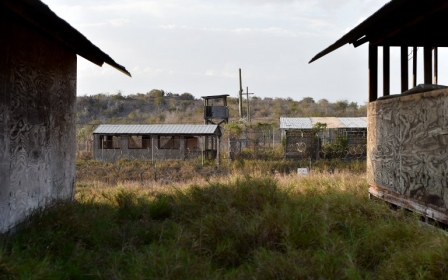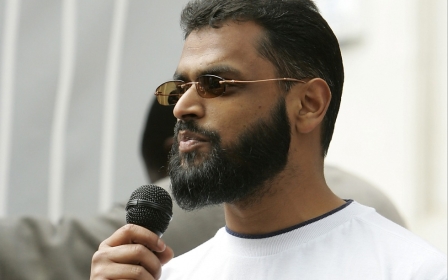EU Guantanamo delegation calls for easing of 'radical' prison conditions

A delegation of five European officials recommended Wednesday that inmates cleared for release from the US military detention center in Guantanamo Bay, Cuba, be jailed under more flexible conditions, an aide said.
Invited by the United States, the delegation's informal visit was meant to help give Europe ideas on how it can help the United States shut down the controversial jail once and for all.
The five European Parliament members, led by French former justice minister Rachida Dati, visited Guantanamo detention camps Tuesday.
Of the 142 inmates remaining, 73 have been cleared for release - some of them years ago during the administration of President Barack Obama's predecessor, George W. Bush - but they remain incarcerated without charges or trial.
In an interview with AFP in Washington Dati stressed that some of the detainees' "detention conditions were extremely radical considering the totally minor evidence against them."
The delegation, which met with and made the proposal to the US State Department and the Organization of American States' human rights commission, proposed that the 73 men be held in a separate camp, "to send a positive signal to third-party countries" that might receive them, Philip Kyle, Dati's parliamentary attache, told AFP.
The inmates are housed in two areas, Camp 5 and Camp 6, with the exception of a handful of "high value" prisoners - such as those accused of involvement in the September 11 attacks - who live in Camp 7.
Under the proposal, the prisoners slated for release would be regrouped in a camp with more flexible conditions in the same manner as Chinese Muslim minority Uighurs, who lived in semi-freedom in Camp Iguana, a small compound within the complex, before their release.
A prisoner's behavior currently dictates whether he is held in Camp 6 or disciplinary Camp 5.
"When you get there, it's not a detention center in the classic sense, it's more like a retention center, which is to say we're keeping from society these people who are considered dangerous or potentially dangerous," Dati said.
"When we can neither establish nor prove that (they are dangerous)... there's no reason for them to stay" at Guantanamo.
Obama pledged during his 2008 campaign he would make it a priority to close the Guantanamo prison, set up after the September 11 attacks to hold detainees from the US "war on terror."
Yet attempts to get the job done have been thwarted by domestic and international obstacles, leaving the fate of the jail and its prisoners in limbo.
"You cannot invoke security for you and humanitarianism for us," Dati said, referring to the practice of sending freed Guantanamo detainees to other countries, after she met with Cliff Sloan, Obama's special envoy for closing Guantanamo.
"Europe of 2003 is not the same as Europe of 2014. France or Belgium or England bear the brunt of jihadism," she said.
The treatment of detainees at Guantanamo has been subject to a raft of criticisms including those relating to the force feeding of prisoners.
US to try mentally ill British terror suspect in 2015
A mentally ill British man will stand trial in the US next year on charges of trying to set up an Al-Qaeda training camp in Oregon 15 years ago, a judge said Monday.
Haroon Aswat, 40, is accused of traveling to the United States in 1999 on a mission to set up a training camp in the remote hamlet of Bly, in the northwestern state of Oregon, to train militants who wanted to fight in Afghanistan.
Prosecutors say he was sent on the mission by radical British preacher Abu Hamza, who was convicted in New York earlier this year on 11 kidnapping and terrorism charges.
Aswat will stand trial in New York on June 1, 2015, US District Judge Katherine Forrest said at a short hearing.
Aswat pleaded not guilty in October. He faces up to 35 years in prison if convicted.
Hamza, the former imam of Finsbury Park mosque in north London, was extradited from Britain in 2012 after an eight-year battle against extradition delayed by multiple appeals.
Aswat's October 21 extradition came despite his diagnosis with paranoid schizophrenia. He has been held in a psychiatric hospital since 2008.
Aswat was arrested in Zambia in July 2005.
Middle East Eye propose une couverture et une analyse indépendantes et incomparables du Moyen-Orient, de l’Afrique du Nord et d’autres régions du monde. Pour en savoir plus sur la reprise de ce contenu et les frais qui s’appliquent, veuillez remplir ce formulaire [en anglais]. Pour en savoir plus sur MEE, cliquez ici [en anglais].




